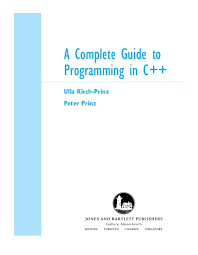📘 قراءة كتاب ++A Complete Guide to Programming in C أونلاين


تركت هذه الصفحة فارغة عمدًا
xi
الفصل 1
الأساسيات 1
تطوير وخصائص C ++ 2
البرمجة الشيئية 4
تطوير برنامج C ++ 6 برنامج C ++
للمبتدئين 8
بنية برامج C ++ البسيطة 10
تمارين 12
الحلول 14
الفصل 2
الأنواع الأساسية والثوابت والمتغيرات 15
الأنواع الأساسية 16
الثوابت 22
تسلسل الهروب 26
الأسماء 28
المتغيرات 30
الكلمات الأساسية ثابتة ومتقلبة 32
تمارين 34
الحلول 36
محتويات
الفصل 3
استخدام الوظائف والفئات 39
الإعلان عن الوظائف 40
استدعاءات الوظيفة 42
نوع فارغ للوظائف 44
ملفات الرأس 46 ملفات الرأس
القياسية 48
استخدام الفئات القياسية 50
تمرين 52
الحلول 54
الفصل 4
الإدخال والإخراج مع التدفقات 57
التدفقات 58
التنسيق والمعالجات 60
الناتج المنسق للأعداد الصحيحة 62
الناتج المنسق للعائم- أرقام النقاط 64
الناتج في الحقول 66
إخراج الأحرف والسلاسل والقيم المنطقية 68
إدخال
منسق 70 إدخال منسق للأرقام 72
إدخال / إخراج غير منسق 74
تمرينات 76
حلول 78
فصل 5
عوامل
التشغيل
للأنواع الأساسية 81 العمليات الحسابية الثنائية 82 العمليات الحسابية الأحادية 84
التعيينات 86 العوامل
العلائقية 88 العمليات
المنطقية 90
التمرين 92
الحلول 94
الفصل 6
التحكم في التدفق 95
بيان الوقت 96
للبيان 98
بيان التنفيذ 102
التحديدات مع if-else 104
سلاسل Else-if 106
التعبيرات الشرطية 108
التحديد باستخدام المفتاح 110
يقفز مع الاستراحة والمتابعة والانتقال إلى 112 تمرينًا
114
الحلول 116
xii
■
المحتويات
الفصل 7
الثوابت ووحدات الماكرو الرمزية 119 وحدة
ماكرو 120
مع معلمات 122
العمل مع #define Directive 124
التضمين الشرطي 126
وحدات ماكرو قياسية لمعالجة الأحرف 128
إعادة توجيه المدخلات والمخرجات القياسية 130
تمرين 132
الحلول 134
الفصل 8
تحويل الأنواع الحسابية 139
تحويلات النوع الضمني 140
أداء الحساب المعتاد تحويلات النوع 142 تحويلات النوع
الضمني في التعيينات 144
المزيد من تحويلات النوع 146
تمرينات 148
حلول 150
الفصل 9
سلسلة الفئة القياسية 153
تحديد سلاسل وتعيينها 154
السلاسل المتسلسلة 156 سلاسل
المقارنة 158
إدخال ومسح السلاسل 160
البحث والاستبدال في السلاسل 162
الوصول إلى الأحرف في السلاسل 164
تمرينًا 166
الحلول 168 وظائف
الفصل 10
171
أهمية الدوال في C ++ 172
وظائف تحديد الوظائف 174
قيمة إرجاع الوظائف 176
وسيطات المرور 178
وظائف مضمنة 180
الوسيطات الافتراضية 182
وظائف التحميل الزائد 184 وظائف
تكرارية 186
تمرين 188
حلول 191
الفصل 11
فئات التخزين ومساحات الأسماء 197
فئات تخزين الكائنات 198
خارجي فئة التخزين 200
المحتويات
■
الثالث عشر
الأعضاء الفئات المشتقة 504
وصول الأعضاء 506
إعادة تعريف الأعضاء 508
بناء وتدمير الفئات المشتقة 510
كائنات من الفئات المشتقة 512
الأعضاء المحمية 514
تمارين 516
حلول 520
الفصل 24
نوع التحويل في الدرجة التسلسلات الهرمية 529
تحويل إلى فئات قاعدة 530
النوع التحويلات والتخصيصات 532
تحويل المراجع والمؤشرات 534
تحويلات النوع الصريح 536
تمرينات 538
الحلول 540
الفصل 25
تعدد الأشكال 543
مفهوم تعدد الأشكال 544
طرق الظاهري 546
تدمير الأجسام المخصصة بشكل حيوي 548
الافتراضية طريقة الجدول 550
الديناميكي يلقي 552
تمارين 554
حلول 558
الفصل 26
فئات مجردة 565
طرق الظاهري الصرفة 566
تجريدية وفئات محددة 568
مؤشرات وإشارات إلى فئات مجردة 570
تعيين الظاهري 572
التطبيق: قوائم غير متجانسة 574
تطبيق ل قائمة غير متجانسة 576
تمرينات 578
حلول 580
فصل 27
وراثة متعددة 587
فئات مشتقة من مضاعفة 588 فئات أساسية
متعددة غير مباشرة 590 فئات أساسية
افتراضية 592
منشئ يدعو 594
تهيئة الفصول الدراسية قاعدة الظاهري 596
تمارين 598
حلول 602
المحتويات
■
السابع عشر
الفصل 28
استثناء مناولة 607
خطأ التقليدية مناولة 608
استثناء مناولة 610
معالجات استثناء 612
رمي والتقاط الاستثناءات 614
استثناء التعشيش مناولة 616
تعريف لديك فئات خطأ الخاصة 618
ستاندرد فئات استثناء 620
تمارين 622
حلول 626
الفصل 29
مزيد من المعلومات حول الملفات 637
فتح ملف للوصول العشوائي 638
تحديد المواقع للوصول العشوائي 640
حالة الملف 644
معالجة الاستثناءات للملفات 646
استمرار الكائنات متعددة الأشكال 648
التطبيق: ملفات الفهرس 652
تنفيذ ملف الفهرس 654
التمارين 656
الحلول 660
الفصل 30
المزيد حول المؤشرات 681
المؤشر إلى المؤشرات 682
عدد الوسيطات المتغير 684 مؤشر
إلى الوظائف 688 التعريفات
المعقدة 690
تحديد أسماء الأنواع 692
التطبيق : مصفوفات ديناميكية 694
تمرينات 696
حلول 698
فصل 31
معالجة البتات 705
عوامل Bitwise 706
معاملات تحويل Bitwise 708
أقنعة بت 710
استخدام أقنعة
بت 712 حقول بت 714
التدريبات 716
الحلول 718
الفصل 32
القوالب 721 قوالب
الوظائف والفئات 722
قوالب التعريف 724
xviii
■
المحتويات
قالب التماثل 726
معلمات
القالب 728 وسائط القوالب 730
التخصص 732 الوسيطات
الافتراضية للقوالب 734
التماثل الصريح 736
التمارين 738
الحلول 742
الفصل 33
الحاويات 749
أنواع الحاويات 750
تسلسل 752
تكرارات 754
تسلسل إعلاني 756
إدخال متتابعات 758
كائن وصول 760
طول وسعة 762
حذف بالتسلسل 764
عمليات قائمة 766
حاوية
ارتباطية 768 مجموعة ومجموعات متعددة 770
خرائط وخرائط متعددة 772
بت 774
تمرين 778
حل 780
ملحق 783
أرقام ثنائية 784
توجيهات معالجات سابقة 787
وحدات ماكرو قياسية محددة مسبقًا 792
وظائف ملزمة 793
نظرة عامة على
المشغلين 795 جدول أسبقية المشغل 797
ASCII جدول الكود 798
تسلسلات التحكم في الشاشة 800
الأدب 801
الفهرس 803
المحتويات
++ دليل كامل للبرمجة في C
c ++ pdf عربي
c ++ pdf كتب
c ++ كيفية برمجة الإصدار التاسع
أمثلة برامج pdf
c ++ أمثلة pdf c ++ أمثلة للمبتدئين
تعلم c ++ خطوة بخطوة
شرح c ++ بالعربي
c ++ كيفية البرمجة تحميل كتاب
حجم الكتاب عند التحميل : 10.3 ميجا بايت .
نوع الكتاب : pdf.
عداد القراءة:
اذا اعجبك الكتاب فضلاً اضغط على أعجبني و يمكنك تحميله من هنا:

شكرًا لمساهمتكم
شكراً لمساهمتكم معنا في الإرتقاء بمستوى المكتبة ، يمكنكم االتبليغ عن اخطاء او سوء اختيار للكتب وتصنيفها ومحتواها ، أو كتاب يُمنع نشره ، او محمي بحقوق طبع ونشر ، فضلاً قم بالتبليغ عن الكتاب المُخالف:
 قبل تحميل الكتاب ..
قبل تحميل الكتاب ..
يجب ان يتوفر لديكم برنامج تشغيل وقراءة ملفات pdf
يمكن تحميلة من هنا 'http://get.adobe.com/reader/'


 منصّة المكتبة
منصّة المكتبة